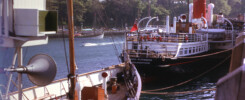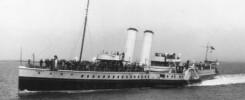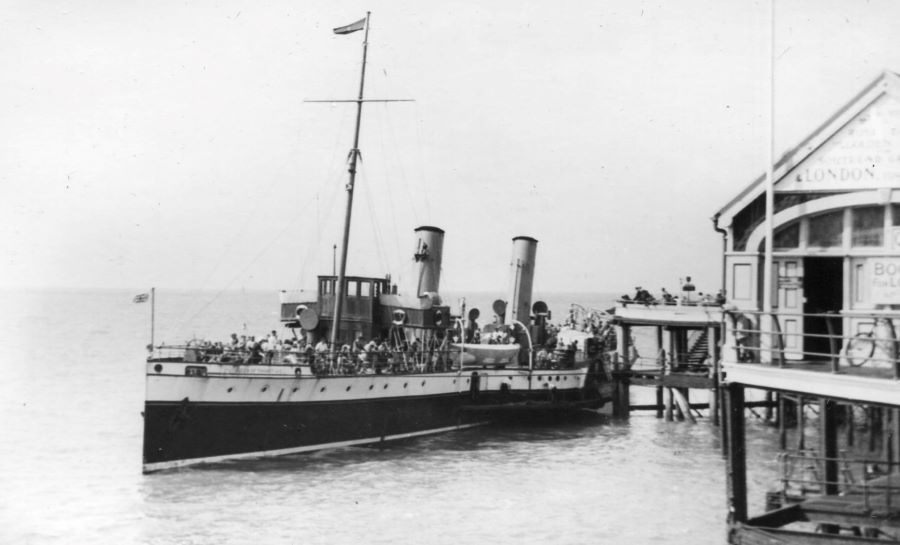
Red Funnel’s second Lorna Doone made her inaugural trip from Bournemouth on Monday 16th May 1949 with a party of distinguished guests entertained to lunch aboard including senior representatives from both Red Funnel and Cosens plus a bevy of other local worthies.
Before the war Red Funnel’s paddle steamer Balmoral had regularly sailed from Southampton and Bournemouth to Cherbourg but she was returned after war service in such poor condition as to be beyond a rebuild. The Medway and Thames paddle steamers, and pretty much identical sister ships, Queen of Thanet and Queen of Kent had had International Passenger Certificates to cross to France before the War so when they came on the market in 1948 Red Funnel pricked up their ears.
Starting their lives in 1916 as purpose-built minesweepers for the Royal Navy, they had been converted for passenger use by one-time Cosens’s master, Captain Shippick, in 1928 for the day trip market from the Medway and Thames across the Channel to France. They were large and fast so might one or other of them be able to revive the pre-war Cherbourg trips? It was also said that Mr Bolson, who owned a shipyard in Poole and ran launches from Bournemouth beach near the pier, had expressed an interest in buying them. Neither Cosens nor Red Funnel wanted to see that happen. For the beach boat operator to acquire two paddle steamers capable of crossing to Cherbourg was unthinkable. So Red Funnel bought them both.
Renamed Solent Queen and Lorna Doone respectively they were prepared for service for the 1949 season with the Lorna based at Poole to take longer excursions from Swanage and Bournemouth and Solent Queen for similar trips from Southampton.
Aboard Lorna Doone on her inaugural trip from Bournemouth on Monday 16th May 1949 was a party of distinguished guests entertained to lunch including senior representatives from both Red Funnel and Cosens as well as a bevy of local worthies.
Alderman A H Little, chairman of Bournemouth Town Council Beach and Pavilion committee said that Lorna Doone would admirably meet Bournemouth’s requirements but he stressed the need for a Bournemouth/Cherbourg service which years ago, when he first came to Bournemouth, was a regular feature of the Bournemouth pleasure steamer season.
Capt C Ball, Chairman of the Swanage Pier Company said that Swanage Pier had been completely re-conditioned – which was more than could be said for Bournemouth Pier.
Capt Clark DSC, general manager of Red Funnel proposed a toast to the ship and her crew led by her master Captain Larkin and went on to say that although there was a good deal of talk about modern methods, there was still a place in the public’s heart and sentiment for a paddle steamer adding that there is something about a paddle steamer which is entirely lacking in other ships.
Mr Kaile, general manager of Cosens, spoke to say that at the present time the Cherbourg service was out of the question because it was laid down by the Home Office that exchange regulations must be observed and passengers must have visas. The company was however constantly endeavouring to revive the cross-Channel trips and had in mind cruises to show people where the D Day landings were made.
Mr Redman, vice chairman of Red Funnel and chairman of Cosens said that Lorna Doone would have to carry a 50% load to pay her way and she had a capacity of 900. He was pleased that Bournemouth Council’s policy was to get steamers worthy of the resort and credit must be given to the company for their enterprise and courage in purchasing and adding to their fleet Lorna Doone.
Mr Foyle and Mr Bartle Hastings spoke of the catering facilities and of the reconditioning of the ship.
Cdr Moss, Bournemouth Pier Master, congratulated the company on their acquisition which he said would be popular at Bournemouth, adding that Bournemouth’s steamers were better than those serving other resorts.
Capt Clark was appointed general manager of Red Funnel in February 1945 and, on his watch, the company added a number of second hand vessels to their fleet including Upton, Robina, Norris Castle, Lorna Doone and Solent Queen. Having just bought Lorna Doone on behalf of the company he comes across in his speech as unsurprisingly bullish and optimistic about his new purchase and paddle steamers in general. However, amongst the other generally congratulatory speeches, there is an underlying cautionary tone from other senior management of both companies with Mr Kaile pointing out that, however much some people might want cross-Channel trips from Bournemouth to Cherbourg, from a practical point of view they were not a realistic possibility in 1949. And Mr Redman flagged up the commercial imperative that Lorna Doone would need to run with a 50% passenger capacity in order to stay solvent and cover costs. That’s at least 450 passengers up the gangway each and every operating day come what may just to break even.
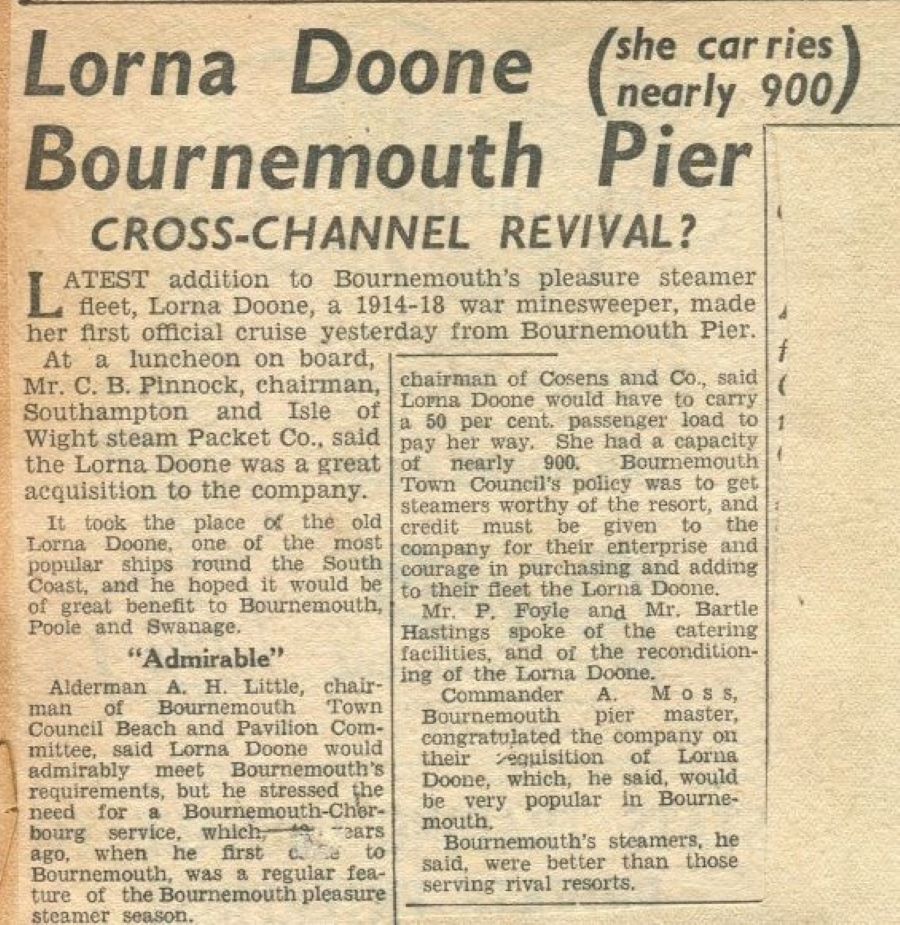
In the end the trips to view the French beaches or to Cherbourg never happened. After further consideration management took the view that such excursions would require too early a start and too late a finish to suit the tastes of most intending passengers and therefore would be unlikely to attract sufficient loadings to make them pay. Alternatively if numbers turned out to be high, then they felt that Lorna Doone’s dining saloon capacity for little more than 100 seated was wholly inadequate to service the inner needs of passengers on a well loaded ship with a capacity of 900 on a long day trip on which they had no opportunity to go ashore to top themselves up with refreshments elsewhere. Red Funnel had a long standing reputation for good customer service and didn’t want to tarnish that by timetabling an excursion which had such an inherent weakness embedded within its business model.
Lorna spent only two full summers, 1949 and 1950, running from Bournemouth to, and around, the Isle of Wight, to Southampton, Ryde, the Island’s east coast piers and so on. She started the 1951 season there once again but was recalled to Southampton in July to take over the schedule of her sister Solent Queen which had suffered a major fire whilst in the middle of her refit on the slipway.
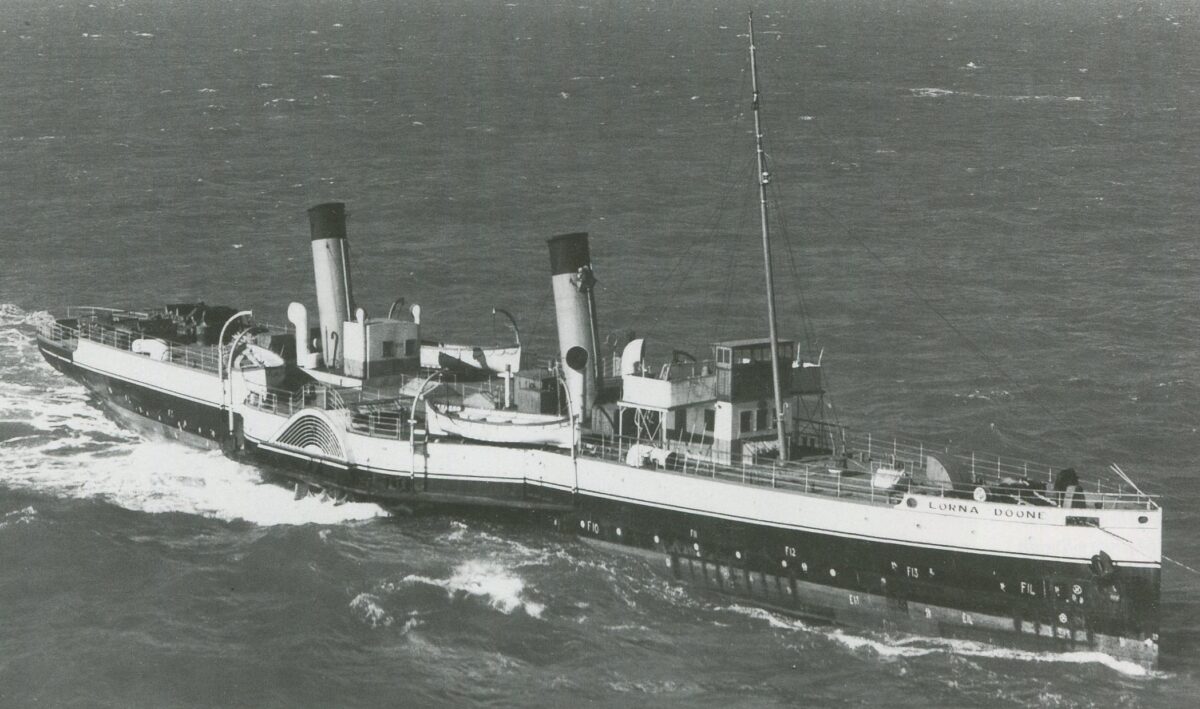
Both ships turned out to have high operating costs being particularly thirsty on fuel and by this stage in their careers, at thirty-five years old, were in need of major structural attention. The Board of Trade asked for some re-plating of Lorna during her refit in November 1951. As plates were removed the situation got ever worse with one thing leading to another so Red Funnel stopped all work. Within two and a half years of the high hopes expressed aboard Lorna on her inaugural cruise from Bournemouth on Monday 16th May 1949, both ships were towed away to be scrapped at Dover.
Capt Clark resigned as Red Funnel’s general manager by mutual agreement with the board in November 1951.
Kingswear Castle returned to service in 2023 after the first part of a major rebuild which is designed to set her up for the next 25 years running on the River Dart. The Paddle Steamer Kingswear Castle Trust is now fund raising for the second phase of the rebuild. You can read more about the rebuilds and how you can help if you can here.
John Megoran
This article was first published on 16th May 2021.

